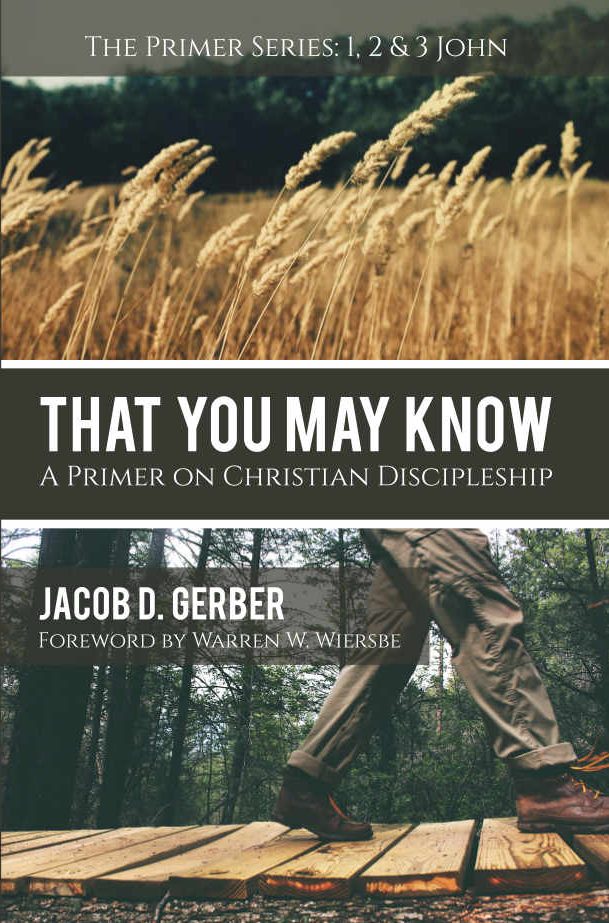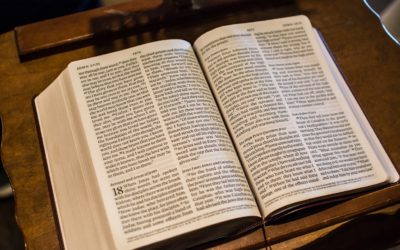Books

While there are many books written about Christian discipleship, there are not nearly enough books on discipleship that primarily expound the Bible itself. The Apostle John wrote three letters, however, with the main purpose of helping disciples to grow.
That You May Know: A Primer on Christian Discipleship is an enriching study that will lead you through John’s teaching on following Jesus as a disciple.
This book is more than a commentary and more than a topical book on the subject of Christian discipleship. Instead, this is a primer on Christian discipleship written as a careful reading of God’s word in 1, 2 & 3 John. It’s ideal for your own individual devotional reading or as a helpful resource for your group Bible study.
Download the First Two Chapters of That You May Know for Free
Bible Studies: Paul's Letter to the Philippians
Studies from my forthcoming pastoral commentary on Paul’s Letter to the Philippians, Have This Mind: A Primer on the Cruciform Life.
Access the complete set of Bible studies from Philippians here.
Bible Studies: The Gospel of John
Access the complete set of Bible studies from the Gospel of John here.
John 16:4b–15: The Treasurer of Jesus
The Holy Spirit is the Treasurer of Jesus: he exposes the bankruptcy of the world and enriches us from Christ’s treasury. (Exposition of John 16:4b–15.)
John 15:18–16:4a: The Enemies of Jesus
Because Jesus’ disciples will resemble Jesus, we must prepare for the enemies that we will face in the world. (Exposition of John 15:18–16:4a.)
John 15:1–17: The Fruit of Jesus
Despite the failure of fruitfulness in Adam and in Israel, God still demands fruit. Jesus bears fruit through his people. (Exposition of John 15:1–17.)
John 14:15–31: The Paraclete of Jesus
After his departure, Jesus is completing his mission—through new agents, by new activities, and from new accomplishments. (Exposition of John 14:15–31.)
John 14:1–14: The Way of Jesus
Jesus is much more than the prophets, priests, and kings of old. More than that, Jesus manifests the Father. (Exposition of John 14:1–14)
John 13:21–38: The Love of Jesus
Although contrary to our ideas of gaining glory through strength, Jesus glorifies himself through self-sacrificial love. (Exposition of John 13:21–38)
Bible Studies: The Book of Genesis
Access the complete set of Bible studies from Genesis here.
Genesis 40:1–23: Do Not Interpretations Belong to God?
Joseph’s interaction with the cupbearer and the baker reflects his confident faith, despite his trials. Still today, interpretations belong to God. (Exposition of Genesis 40:1–23)
Genesis 39:1–23: The Lord was with Joseph
As Joseph’s circumstances become increasingly worse, we find the strongest affirmations that the Lord is with him every step of the way. The Lord is with his people, even in their suffering. (Exposition of Genesis 39:1–23)
Genesis 38:1–30: More Righteous than I
Even in the horrifying story of Tamar’s seduction of Judah, God is still at work. Judah begins with thorough spiritual blindness, because God opens our eyes to our unrighteousness. (Exposition of Genesis 38:1–30)
Genesis 37:12–36: Joseph the Captive
In Genesis 37:12–36, Joseph suffers tremendously at the hands of his brothers. Even so, God works all things together for our Good. (Exposition of Genesis 37:12–36)
Genesis 37:1–11: Joseph the Dreamer
The introduction to Joseph portrays him as a faithful prophet who one day will become a ruler. For this, Joseph’s brothers hate him. (Exposition of Genesis 37:1–11)
Genesis 36:1–37:1: The Settlement of Jacob
God excludes Esau to prepare for the coming of Christ into the world. Thus, God excludes the worldly from his promises in order to enroll the whole world as his people. (Exposition of Genesis 36:1–37:1)
Bible Studies: Paul's First Letter to the Corinthians
Access the current set of Bible studies from 1 Corinthians here.
1 Corinthians 3:1–17: The Temple of God
God builds his Church spiritually—through the accomplished work Jesus Christ and him crucified, and by the work of the Holy Spirit. God alone gives the growth, but his people are the instruments by which God gives the growth. (Exposition of 1 Corinthians 3:1–17)
1 Corinthians 2:6–16: Wisdom from the Holy Spirit
In his wisdom, God planned in eternity past to save sinners by the person and work of Jesus Christ, but the world cannot discern that wisdom. Thus, God sends his Holy Spirit to reveal his hidden wisdom in Christ. (Exposition of 1 Corinthians 2:6–16)
1 Corinthians 1:26–2:5: Christ and Him Crucified
If the cross is foolishness, and preaching is weakness, how does anyone ever come to believe in Christ? God calls his people to boast in Christ by the power of the Holy Spirit. (Exposition of 1 Corinthians 1:26–2:5)
1 Corinthians 1:18–25: The Foolishness and Weakness of God
The cross seems to be folly, yet, to those who are called, it is the power of God and the wisdom of God unto salvation. God calls fools to faith by the folly of the cross. (Exposition of 1 Corinthians 1:18–25)
1 Corinthians 1:1–17: Christ’s Holy, Divided Church
The people in the Church of God are called to be holy, and yet are sinfully divided. You cannot have the whole Christ without the whole Church. (Exposition of 1 Corinthians 1:1–17)
Bible Studies: The Letters of John
Access the complete set of Bible studies from the Letters of John here.
1 John 1:5–2:6: Gospel
The good news of the gospel corrects the way we see sin. The gospel allows us to confess our sin, rather than denying it or embracing it. (Exposition of 1 John 1:5–2:6)
1 John 1:1–4: Truth
Before we can benefit from the good news of the gospel, we need the news of the blazing, glorious light of God and his truth. (Exposition of 1 John 1:1–4)
Bible Studies: The Gospel of Luke
Access a handful of Bible studies from the Gospel of Luke here. These were studies written during the Advent season of 2018. At the moment, I do not have plans to continue working through the Gospel of Luke; however, I wanted to make these few studies available online for whomever may benefit from them.
Bible Studies: The Book of Ecclesiastes
Access the complete set of Bible studies from the Book of Ecclesiastes here.
Ecclesiastes 1:12–2:26: What God Gives to the Children of Man
To prove that “all is vanity” and even “vanity of vanities,” the Preacher embarks on an exhaustive search of happiness in this world. God gives enjoyment to those who trust in him. (Exposition of Ecclesiastes 1:12–2:26)
Ecclesiastes 1:1–11: Nothing New Under the Sun
How do we live in a world that is natural, and not spiritual (1 Cor. 15:42–46)? Furthermore, how do we live in a world that is fallen and cursed by sin? There is no salvation under the sun. (Exposition of Ecclesiastes 1:1–11)
Bible Studies: The Gospel of Matthew
Matthew 26:30–35: Denying Jesus
Though Jesus’ disciples make brash promises, they all fail him. The Good Shepherd died for sheep who are helpless to help him. (Exposition of Matthew 26:30–35)
Matthew 26:26–29: The Lord’s Supper
As Jesus institutes the Lord’s Supper, he offers true communion with him. That is, Jesus offers himself to us in the Lord’s Supper. (Exposition of Matthew 26:26–29)
Matthew 26:14–25: “Is It I, Lord?”
Judas contrasts sharply against the other disciples to leave us a lasting warning: examine your heart as you come to the table of the Lord. (Exposition of Matthew 26:14–25)
Matthew 26:1–13: Preparing for Jesus’ Burial
As the time arrives for Jesus to go to the cross, we see four very different ways for preparing for his crucifixion. Prepare your life around the crucifixion of Jesus. (Exposition of Matthew 26:1–13)
Matthew 25:14–46: Preparing for Christ’s Coming
After telling his disciples that they should prepare for his coming, Jesus then tells them how to do that: Prepare for Christ’s coming by fruitful labor and faithful love. (Exposition of Matthew 25:14–46)
Matthew 24:36–25:13: An Hour You Do Not Expect
Jesus warns his disciples that they will not know when he will return. Therefore, expectantly prepare for Christ’s unexpected return. (Exposition of Matthew 24:36–25:13)
Bible Studies: First Peter
Bible Studies: The Book of Acts
Acts 6:1–7: The Ministries of Word and of Deed
In the ordination of the first deacons, we see that Jesus builds his church through ministries of word and of deed. (Exposition of Acts 6:1–7)
Acts 5:17–42: Obey God Rather than Men
As the world rages against Christ and his servants, God overturns the judgments of this world. (Exposition of Acts 5:17–42)
Acts 5:12–16: A Compelling Gospel
In response to the judgment of Ananias and Sapphira, the fear of the Lord compels a response to Jesus, one way or another. (Exposition of Acts 5:12–16)
Acts 5:1–11: Testing the Spirit of the Lord
The terrifying story of Ananias and Sapphira teaches that the fear of the Lord drives out hypocrisy. (Exposition of Acts 5:1–11)
Acts 4:32–37: One Heart, One Mind, One Body
By leading individuals to give sacrificially to meet needs, the Holy Spirit unites the church in one heart, one mind, and one body. (Exposition of Acts 4:32–37)
Acts 4:23–31: Praying for Boldness
The early church sought boldness through prayer, since Christians must suffer boldly for Jesus. (Exposition of Acts 4:23–31)

































